By Jenna Remley
I knew almost nothing about the plot of Link’s Awakening when I started playing the Nintendo Switch remake that came out in 2019. As someone who’s played other Zelda games, the structure of the game is extremely familiar - although it may have been more groundbreaking when this game was first released in 1993. Here’s the gist: You’re Link, and you’re a hero. You are given a quest that requires you to explore this land and collect a number of magical items, all of which lay at the end of puzzle- and combat-heavy areas called dungeons.
The game begins with Link washing up on the shore of the island of Koholint, and being found by a girl named Marin. Marin takes Link from the beach and brings him to her home in Mabe Village to convalesce. At the start of the game, she provides a lot of background, describing the mythology of the mysterious Wind Fish that slumbers at the top of a mountain. For much of the game, she stands in the center of the village and sings, greeting you happily whenever you stop to chat. There’s one sequence where you get to have a deeper conversation with her, where she expresses her desire to leave the island and explore the world outside of it.
When you first head out from the village, you’re greeted by a mysterious owl who instructs you to collect eight magical musical instruments in order to wake up the Wind Fish and escape the island. Each instrument is found at the end of a dungeon, guarded by a boss - although, strangely, in this game the bosses are referred to as “Nightmares.” So I followed these directions, discovering more of the island I’d washed up on as I went. It’s a cute game, there are some fun characters, the puzzles feel sufficiently challenging while not overwhelming. I had a good time playing.
Then, maybe two-thirds of the way through the game, you gain a piece of information that shifts your understanding of the game’s world. This is your last spoiler warning, so if you don’t want to know the main plot twist of the game, don’t read further.
In a mysterious, ancient shrine, you find an inscription that reveals that if you succeed on your current quest and wake up the Wind Fish, it will cause this island and everything on it to cease to exist - because it’s all just a dream.
I was genuinely shocked and aghast at this revelation. I had not spent terribly long playing this game, but I had still developed a fondness for the fictional island - the provincial citizens of Mabe Village, the foppish banished prince, the anthropomorphic inhabitants of Animal Village, and of course Marin. Discovering that my quest could cause all those inhabitants to disappear caused a sinking feeling in my chest.
And then, for a moment, I almost wanted to laugh at myself - what did it matter if these fictional characters all disappeared? They are, after all, fictional. They’re just pixels on my screen, pieces of code programmed into a game that I’d spent fewer than a dozen hours playing. I hadn’t even felt all that attached to the characters or setting until they were suddenly threatened. I had no personal stake in the existence or survival of these characters - I was just following the instructions of the game, so I could have a fun time solving puzzles and killing enemies. Right?
But still, I felt sad. I had experienced this world as Link, who showed up with no apparent memory of anything beyond the island - at least, nothing that is shared with the player. And so, from my perspective, this island was my whole life - the only place where I had friends, where I had discovered beautiful things, where I had places to go to for rest and solace. I had taken a number of actions throughout the game to help out the inhabitants of the island - what were those actions worth, if I was ultimately going to bring about their demise?
My owl guide approached me when I left the shrine and said that the island may just be a dream, but that was a rumor, and I needed to move ahead regardless. Link’s Awakening doesn’t give you any options except to move forward with your plan anyway - besides, I suppose, just choosing to stop playing the game. So I moved through the next few dungeons, explored new locations on the map, talked to more NPCs, and defeated more monsters.
When I had collected all of the instruments and I knew that the only thing left to do was go wake the Wind Fish, I stopped back in Mabe Village. I spoke to Marin, my rescuer and closest friend. She said, “Someday you will leave this island…” and then playfully added, “Don’t ever forget me...If you do, I’ll never forgive you!”
So, with no other options, I climbed the mountain at the top of the island, played the instruments, and entered the final location of the game. I had to fight a number of Nightmares, and I finally realized why they were called that - because this was all just a dream, making the evil parts of it a nightmare. Once I had succeeded, I met the owl for the last time. It told me it was a part of the Wind Fish’s spirit - which made me feel a bit betrayed, since it must have known all along that the island was a dream, but insisted it was just a rumor to convince me to continue my quest. I may have been the hero of the story, but I was also a pawn.
Then, the Wind Fish himself arrives. He tells me that Koholint was all a dream, but that “it be the nature of dreams to end.” He states that “only the memory of this dream land will exist in the waking world,” and “that memory makes the dream world real.” Then he entreats me to play the instruments, and wake us both. I did so, and the island faded to white.
The game leaves you with this reality, without stating much about whether it was good or bad - whether you made the right choice in waking the fish. The Nightmares wanted to rule over Koholint, and maybe eventually they would have, turning the idyllic island into a horrifying landscape for the adorable inhabitants - maybe by ending the dream, I saved them from a worse fate. But maybe I could have remained on the island, fighting back against the Nightmares when necessary, living out my life in a dream, maintaining the peace for the people and creatures I grew to love. Or maybe it is the nature of dreams to end, and I’m foolish to think there could be some perfect solution; maybe since Marin and everyone else was dreamed into existence, they were destined to disappear someday, whether by my hand or not.
But Marin’s last words to me entreated me to remember her, and the Wind Fish insisted that memories made the dream world real. Whether or not Marin knew she was a dream, she lives on beyond the Wind Fish’s waking because I remember her. Even if my time on the island was brief, it still happened - it still affected me, made me feel things and taught me lessons, so it all matters, even if it’s gone now.

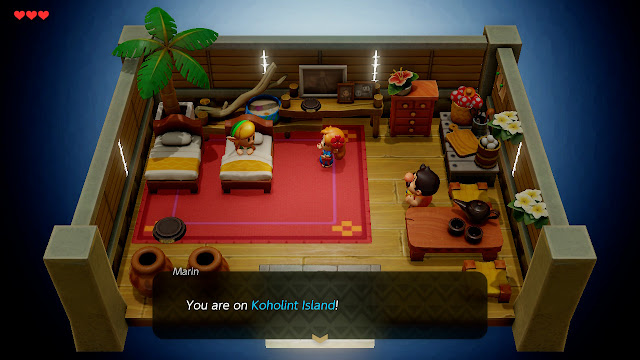
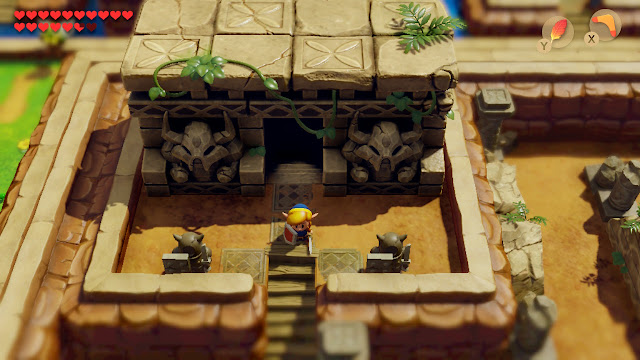
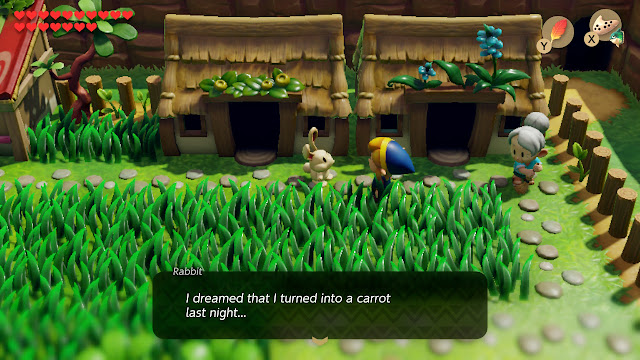
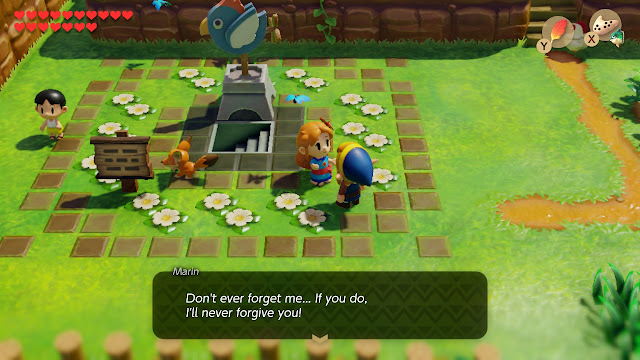
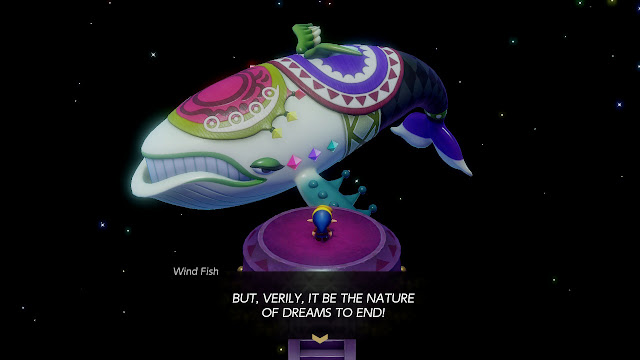



1 Comments
https://youtu.be/YkGJmFjfx6Q
ReplyDeleteJust thought I'd share my favorite rendition of the song that ties this entire game together. A separate essay could probably be written on this song alone.